五年级英语秋季培优第17讲 How nice the flowers are
冀教版五年级英语下册 Lesson 17 教学课件
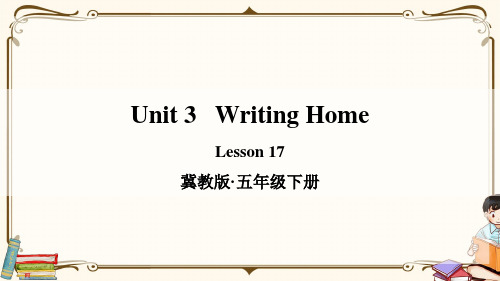
Dear Danny, It’s cold and snowy in Canada now. I’m wearing my new winter coat. Are there many famous places in Beijing? Remember to take some pictures. I’ll be happy to see you again. Say hi to your friends for me. Your friend, Steven
Read. Tick or cross. √□1. This is an email from Steven. ×□2. This email is to Jenny. √□3. Steven is Danny’s friend. ×□4. It’s sunny in Canada. ×□5. Steven is in Beijing.
Language points
①How’s the weather in Canada? 加拿大的天气怎样啊? 这是一个询问某地天气的句子。一般情况下,询问天气
情况的句型有两种: How’s the weather in +地点? What’s the weather like in +地点? 这两个句型的答语一般是:It’s +天气形容词(sunny,
Thank you. We’ll miss you, too.
Don’t forget to write to us.
Language points
① Tomorrow you’ll go back to Canada. 明天你将要回加拿大了。 you’ll 是you will 的缩写形式,意为“你将……”。will
北师版小学英语五年级上册unit 5 lesson 17教案

北京版小学英语五年级英语学习基础很重要,记住单词,默写单词,不要粗心大意。
北京版小学英语和你一起共同进步学业有成!Unit 5 Where are you from? Lesson17教案LESSON 17 第1课时一、教学内容:(一)主题课文:Guoguo: Mike, can you tell me more about Canada?Mike: Yes. It’s in North America. Ottawa is the capital. It’s in the east of the country. But I’m from the west.Guoguo: I know your national flag is very beautiful. There is a red maple leaf in the center of it.Mike: Yes. We Canadians speak both English and French.(二)词汇:四会单词:Canada north but west French both Canadian beautiful very认读单词: Harbin / north Chengdu / west Guangzhou / south(三)功能句型:Can you tell me more about Ottawa?It’s in the east of the country.二、教学目标:(一)知识与技能目标:1. 能正确理解课文内容,朗读课文,程度好的学生可以表演对话。
2. 了解加拿大的首都、所在的位置、国旗、国旗上的图案、及加拿大的语言。
在次基础上,学生能听懂会说表达请求的功能用语,并能在实际情境中中初步学习使用。
Can you tell me more about Ottawa?It’s in the east of the country.1. 能听说读写:north but west both beautiful very , 强化th w cho er u的读音。
人教版五年级下册Lesson 17
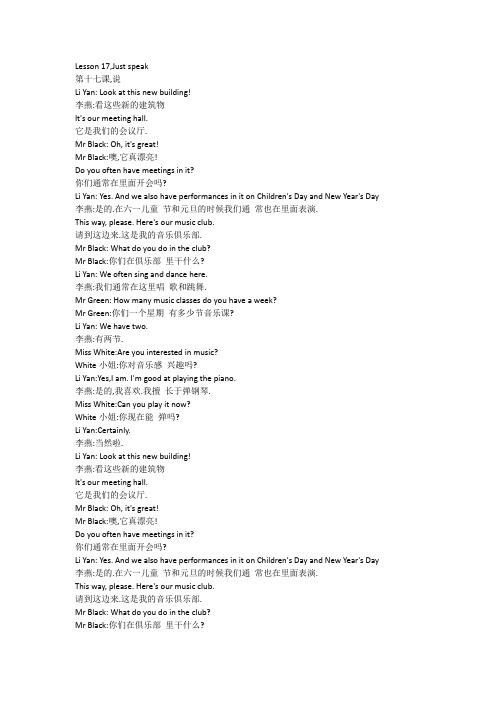
Lesson 17,Just speak第十七课,说Li Yan: Look at this new building!李燕:看这些新的建筑物It's our meeting hall.它是我们的会议厅.Mr Black: Oh, it's great!Mr Black:噢,它真漂亮!Do you often have meetings in it?你们通常在里面开会吗?Li Yan: Yes. And we also have performances in it on Children's Day and New Year's Day 李燕:是的.在六一儿童节和元旦的时候我们通常也在里面表演.This way, please. Here's our music club.请到这边来.这是我的音乐俱乐部.Mr Black: What do you do in the club?Mr Black:你们在俱乐部里干什么?Li Yan: We often sing and dance here.李燕:我们通常在这里唱歌和跳舞.Mr Green: How many music classes do you have a week?Mr Green:你们一个星期有多少节音乐课?Li Yan: We have two.李燕:有两节.Miss White:Are you interested in music?White小姐:你对音乐感兴趣吗?Li Yan:Yes,I am. I'm good at playing the piano.李燕:是的,我喜欢.我擅长于弹钢琴.Miss White:Can you play it now?White小姐:你现在能弹吗?Li Yan:Certainly.李燕:当然啦.Li Yan: Look at this new building!李燕:看这些新的建筑物It's our meeting hall.它是我们的会议厅.Mr Black: Oh, it's great!Mr Black:噢,它真漂亮!Do you often have meetings in it?你们通常在里面开会吗?Li Yan: Yes. And we also have performances in it on Children's Day and New Year's Day 李燕:是的.在六一儿童节和元旦的时候我们通常也在里面表演.This way, please. Here's our music club.请到这边来.这是我的音乐俱乐部.Mr Black: What do you do in the club?Mr Black:你们在俱乐部里干什么?Li Yan: We often sing and dance here.李燕:我们通常在这里唱歌和跳舞.Mr Green: How many music classes do you have a week? Mr Green:你们一个星期有多少节音乐课?Li Yan: We have two.李燕:有两节.Miss White:Are you interested in music?White小姐:你对音乐感兴趣吗?Li Yan:Yes,I am. I'm good at playing the piano.李燕:是的,我喜欢.我擅长于弹钢琴.Miss White:Can you play it now? Li Yan:Certainly. White小姐:你现在能弹吗? 李燕:当然啦.Lesson 18,1.Just practise第十八课,1.练习How many music classes do you have a week?你们一个星期有多少节音乐课?We have two.我们有两节.What do you do in the music club?你们在音乐俱乐部做些什么?We often sing and dance.我们通常是唱歌和跳舞.music club play the violin listen to music音乐俱乐部弹钢琴听音乐art club paint draw艺术馆绘画画画4.Let's read and chant Uu4.让我们一起读和吟唱The music is for the Duke.音乐是给公爵的。
五年级英语Lesson17Let’sbuypostcards的优

五年级英语Lesson17Let’sbuypostcards的优五年级英语Lesson 17 Let’s buy postcards的优秀教案Lesson Plan( Assignment for Nov. 18th)Aim: Students will be able to identify some foodstuffs and talk about likes of food.Students: Grade 1, from Experimental Primary School attached to BNU.Size of class: 48Time: 40 mins.Language: lunch, beef, chicken, hamburger, candy, etc.---Would you like some…?---Yes, please./ No, thanks. I don’t like…Assumption: The students have learned some words on drinks and foods such bread and cake. They have learned how to response to the question “ Would you like some drinks?”Procedure:1. Warm-up ( Review)How are you?What is the weather today? It’s cold and sunny.Who can tell me what you have learned last time?2. Presentation of new language itemsWe are going to learn how to tell people about your likes.(Take out a bottle of apple juice)What’s this? This is apple juice.I like apple juice.Do you like apple juice?(Ask students to guess the meaning of the sentence pattern. Then do some drills both individually and in chorus.)---Do you like tea? ---No, I don’t. I don’t like ….---Do you like coffee?---Yes, I do.……3. Identifying the foodstuffs(Demonstrate the pictures of food and then stick them one by one on the board)What is this? It’s …….Do you like….?4 Story-telling: A Lunch in the ForestI am going to tell you a story. Then, I will ask your some questions. Listen carefully.(Stick a paper clock on the board and show the time 12 o’clock.)The tiger, the king of the forest, is going to invite some animals to lunch. Can you guess who they are? They are Mr. Giraffe, Mr. Fox, Mr. Cat, Mr. Money, Mr. Mouse, and Mr. Pig. ( Stick pictures of the animals on the board around the foodstuff.) The tiger asks the animals what they would like to eat. “ Mr. Giraffe, would you like some meat?” Mr. Giraffe says, “ No, thanks. I don’t like meat. I like some grapes.” “ Mr. Fox, would you like some meat?” Mr. Fox says, “ Yes, please.Thank you.” Finally, every animal has the food they like. They begin to eat. ( make some facial expression) “ Oh---. It’s good.” They have a good lunch.( Some parts of the story is told with Chinese translation. The teacher is suggested to imitate the voice of the animals in different tones and various facial expression.)5.Questions & Answers ( in Chinese)Would Mr. Giraffe like some meat? What does it say?Would Mr. Fox like some meat? What does it say?……When they begin to eat, what do they say?6. Communicative activities: Role-play ( in pairs)( Ask some pairs of students to come in front and do the role-play)If you invite a friend to lunch, what do you say to the friend? Choose some food form those on the board.7. Homework:Ask students to draw pictures of food they like to eat for lunch to home and take the picture to class next time.教学反思:通过图片介绍了明信片、信和电子邮件,提到了同学学习的兴趣,整节课都精力充分.。
五年级下册英语精通版第17课

五年级下册英语精通版第17课一、单词部分。
1. 重点单词。
- 列出课文中的新单词,例如:如果有关于描述动物(假设课文主题是动物)的单词,像“elephant(大象)”“giraffe(长颈鹿)”等。
- 单词的发音:标注音标,如“elephant [ˈelɪfənt]”。
- 词义解释:简单解释单词的意思,可以举例说明用法,例如“An elephant is a very large animal. It has a long nose.”2. 单词记忆方法。
- 联想记忆:对于“giraffe”,可以联想它长长的脖子,像电线杆一样,帮助记忆单词的形状和意义。
- 读音记忆:根据单词的发音规则来记忆,如“elephant”中“e”发[e],“ph”发[f]等。
二、课文部分。
1. 课文内容概括。
- 简单描述课文的主要情节或者主题。
如果是对话形式的课文,说明对话发生的场景和人物之间的交流内容。
例如:课文是关于动物园之旅,对话发生在两个小朋友之间,他们在讨论看到的动物。
2. 重点句型。
- 找出课文中的重点句型,如“ - What can you see? - I can see a giraffe.”- 句型的用法:解释句型在什么情况下使用,对于上述句型,可以说这是用来询问和回答看到的事物的。
- 句型的拓展:例如将“a giraffe”换成其他动物或者事物,“ - What can you see? - I can see a big tree.”3. 语法点。
- 如果课文中有新的语法知识,如一般现在时的特殊疑问句(像上面的“What can you see?”),解释语法规则。
在这个例子中,“What”是特殊疑问词,“can”是情态动词,后面接动词原形“see”。
三、练习部分。
1. 听力练习。
- 如果有听力相关的练习,可以提供一些听力技巧,如听前先浏览题目,预测可能听到的内容;听时注意关键词等。
- 可以自己编写一些简单的听力练习题目,例如听单词选图片(如果单词是关于动物的,就给出动物的图片让学生选择)。
五年级英语上册17课教案
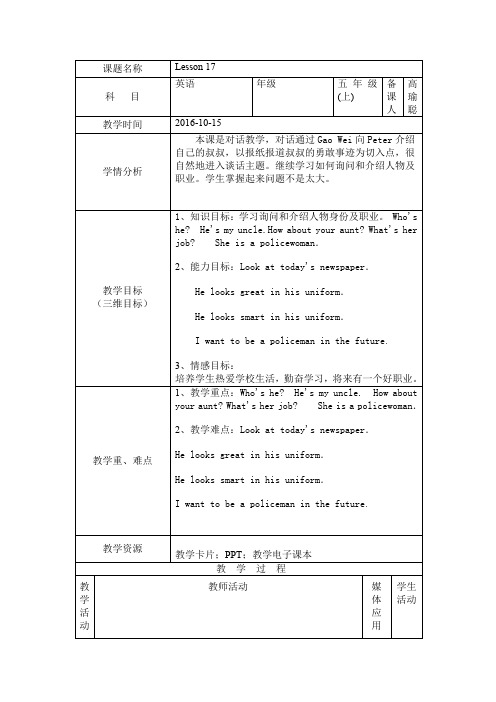
Lesson 17
科目
英语
年级
五年级(上)
备课人
高瑜聪
教学时间
2016-10-15
学情分析
本课是对话教学,对话通过Gao Wei向Peter介绍自己的叔叔,以报纸报道叔叔的勇敢事迹为切入点,很自然地进入谈话主题。继续学习如何询问和介绍人物及职业。学生掌握起来问题不是太大。
教学目标
(三维目标)
1、Say:Let`s go on talking about jobs.Play the e-text and let the students watch and observe the picture,ask;
1)what`s this?
2)Who's the man in today's newspaper?
教学过程
教学活动
Step1、Warming-up / Revision
1)Show the PPT and let the students say the words of jobs quickly.
2)Free talk
What does he/she do? What do they do?
Step2|、Presentation)
Homework:Finish the exercises in woo the e-text and answer.
Who's he?He's a fireman.
He's my uncle.
How about your aunt?
What's his job?She is a policewoman.
2、教学难点:Look at today's newspaper.
小学英语《Unit17 What season do you like best》省级名师优质课教案比赛获奖教案示范课教案公开课教案
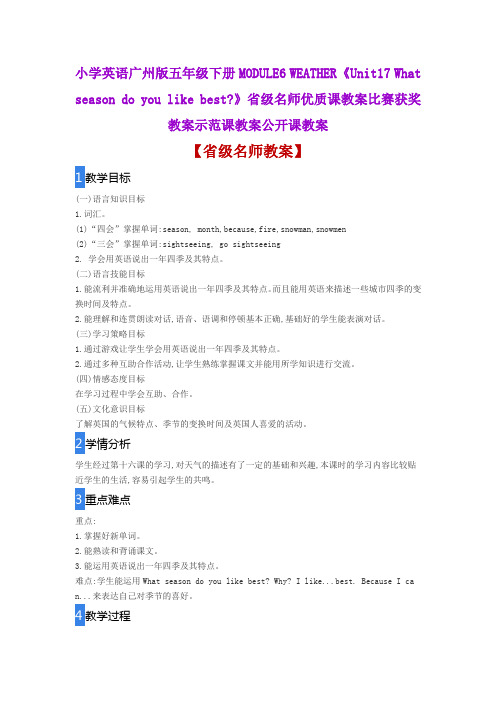
小学英语广州版五年级下册MODULE6 WEATHER《Unit17 What season do you like best?》省级名师优质课教案比赛获奖教案示范课教案公开课教案【省级名师教案】1教学目标(一)语言知识目标1.词汇。
(1)“四会”掌握单词:season, month,because,fire,snowman,snowmen(2)“三会”掌握单词:sightseeing, go sightseeing2. 学会用英语说出一年四季及其特点。
(二)语言技能目标1.能流利并准确地运用英语说出一年四季及其特点。
而且能用英语来描述一些城市四季的变换时间及特点。
2.能理解和连贯朗读对话,语音、语调和停顿基本正确,基础好的学生能表演对话。
(三)学习策略目标1.通过游戏让学生学会用英语说出一年四季及其特点。
2.通过多种互助合作活动,让学生熟练掌握课文并能用所学知识进行交流。
(四)情感态度目标在学习过程中学会互助、合作。
(五)文化意识目标了解英国的气候特点、季节的变换时间及英国人喜爱的活动。
2学情分析学生经过第十六课的学习,对天气的描述有了一定的基础和兴趣,本课时的学习内容比较贴近学生的生活,容易引起学生的共鸣。
3重点难点重点:1.掌握好新单词。
2.能熟读和背诵课文。
3.能运用英语说出一年四季及其特点。
难点:学生能运用What season do you like best? Why? I like...best. Because I ca n...来表达自己对季节的喜好。
4教学过程。
五年级英语上册17-21课教案
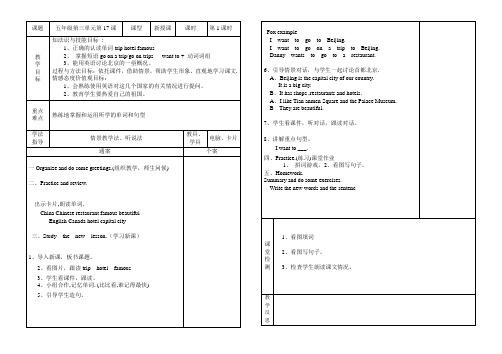
4、创设情景,让学生扮做不同角色合作进行对话.
5、小组练习,模仿对话。(课文内容)
四、song
learn to sing the song.
五、Practice.
教师巡回指导。
六、Summary and do some exercises.
Fox example
from Shijiazhang toBeijing
fromBeijingtoGuangzhou
学生看课件,跟读对话。
学生两人一组练习,模仿对话。
4、创设情景,教师扮做李明的妈妈与学生合作进行对话.
MayI……..? Yes, you may.
No, you may not
四、Practice.(练习)
It is a big city.
B、It has shops ,restaurants and hotels.
A、I like Tian anmen Square and the Palace Museum.
B They are beautiful.
7、学生看课件,听对话,跟读对话。
8、讲解重点句型。
4、引导学生看课件,学习对话。(课文内容)
看课件,听对话,跟读对话,想对话的大概意思。
引导学生两人一组,进行对话练习。
A、How far is it from ___to ___?
B、About ___kilometres.
四、Practice.(练习)
与学生一起进行情景演示教师巡回指导。
五、Homework.
1、熟练地认读下列单词:about
2、认识100到10000的数字
- 1、下载文档前请自行甄别文档内容的完整性,平台不提供额外的编辑、内容补充、找答案等附加服务。
- 2、"仅部分预览"的文档,不可在线预览部分如存在完整性等问题,可反馈申请退款(可完整预览的文档不适用该条件!)。
- 3、如文档侵犯您的权益,请联系客服反馈,我们会尽快为您处理(人工客服工作时间:9:00-18:30)。
Lesson 18
Part 1 IQ questions
a. Now three boys are on a bus. A speaks Chinese and Japanese. B speaks English and Chinese. C can only talk with A. What language does C speak? C can speak ________.
b. Jack was a very poor boy, but now he is very rich. Every dog has its day. Can you guess the meaning of the underlined sentence?
___________________________________________________________________________
c. The letters in the puzzle stands for the numbers 0—5. Can you work it out?
A C D
B C
+ C E D B D
F B A D C
Part 2:Fun Reading:
Kelly: Peter, I swallowed an orange-pit.
Peter: Don’t drink water anyway. When the seed gets water, it will sprout and grow. If you drink water, an orange tree will grow up through your head.
Part 3: Reading
First listen and then answer the question.
What two interruptions did the writer have?
After breakfast, I sent the children to school and then I went to the
shops. It was still early when I returned home. The children were at
school. My husband was at work and the house was quiet. So I decided
to make some meat pies. In a short time I was busy mixing butter and
flour and my hands were soon covered with sticky pastry. At exactly that
moment, the telephone rang. Nothing could have been more annoying. I
picked up the receiver between two sticky fingers and was dismayed when I recognized the voice of Helen Bates. It took me ten minutes to persuade her to ring back later. At last I hung up the receiver. What a mess! .There was pastry on my fingers, on the telephone, and on the doorknobs. I had no sooner got back to the kitchen that the doorbell rang loud enough to wake the dead. This time it was the postman and he wanted me to sign for a registered letter.
New words and expressions.
sticky /'stiki/ adj. dismay /dis’meI/ v.
finger /'fiŋgə / n. recognize /'rekəgnaIz/ v.
pie /pai/ n. persuade /pə'sweid/ v.
mix /miks/ v. mess /mes/ n.
pastry /'peistri/ n. doorknob /'dɔ:nɑb/ n.
annoying /ə'nɔI-Iŋ/ adj. sign /sain/ v.
receiver /ri'si:və/ n. register /'reʤIstə/ v.
interruption n.
Question:
1. When did the writer send the children to school?
.
2. What did the writer do after then?
.
3. Was the writer’s husband at home?
.
4. What did the writer decide to do?
.
5. Who telephoned then?
.
6. Was the doorbell rang loud or quiet?
.
Part 4:Pattern Tranformation
1. Caroline often goes to school by bus. (就画线部分提问)
_________ does Caroline often _________ to school?
2. Do it quickly. (改为否定句)
________ _________ it quickly.
3. Shirley spends a lot of time at weekends watching TV.(改为一般疑问句)
______ Shirley _______ a lot of time at weekends watching TV?
4. It will take Leo about fifty minutes to get there. (就画线部分提问)
_________ _________ will it take Leo to get there?
5. It is a nice watch.(改为感叹句)
_________ a _________ watch it is!
6. What's wrong with Judy?
________ the _________ with Judy?
7. Why don't we go to the seaside? It's very beautiful.
_________ _________ go to the seaside? It's very beautiful.
8. Book B is easier than Book A.
Book A is _________ _________ than Book B.
9. How do you like Chinese food, Jenny?
________ do you _________ of Chinese food, Jenny?
10. Mr Edison usually takes a train to work.
Mr Edison usually _________ to work _________ train.
Part 6:Open Your Mouth
(1)A snow year, a rich year.
A good medicine tastes bitter.
Birds of a feather flock togethe r
1. How many hours of TV do you watch each week?
2. Do you think you watch too much TV? Why or why not?
3. What kinds of TV shows do you most like and dislike?
4.Do you think watch TV is good or bad? Give your reasons.
YOUR HOMEWORK.
Do you know the Chinese names of the following movies?
◆King Kong ____________ ◆Harry Potter ___________
◆Star war ____________ ◆Titanic ____________
◆Spider Man ____________ ◆Shrek ____________
◆The Lion King ____________ ◆Pirates of the Caribbean ____________
◆The Banquet ____________ ◆Curse of the Golden Flower _____________。
